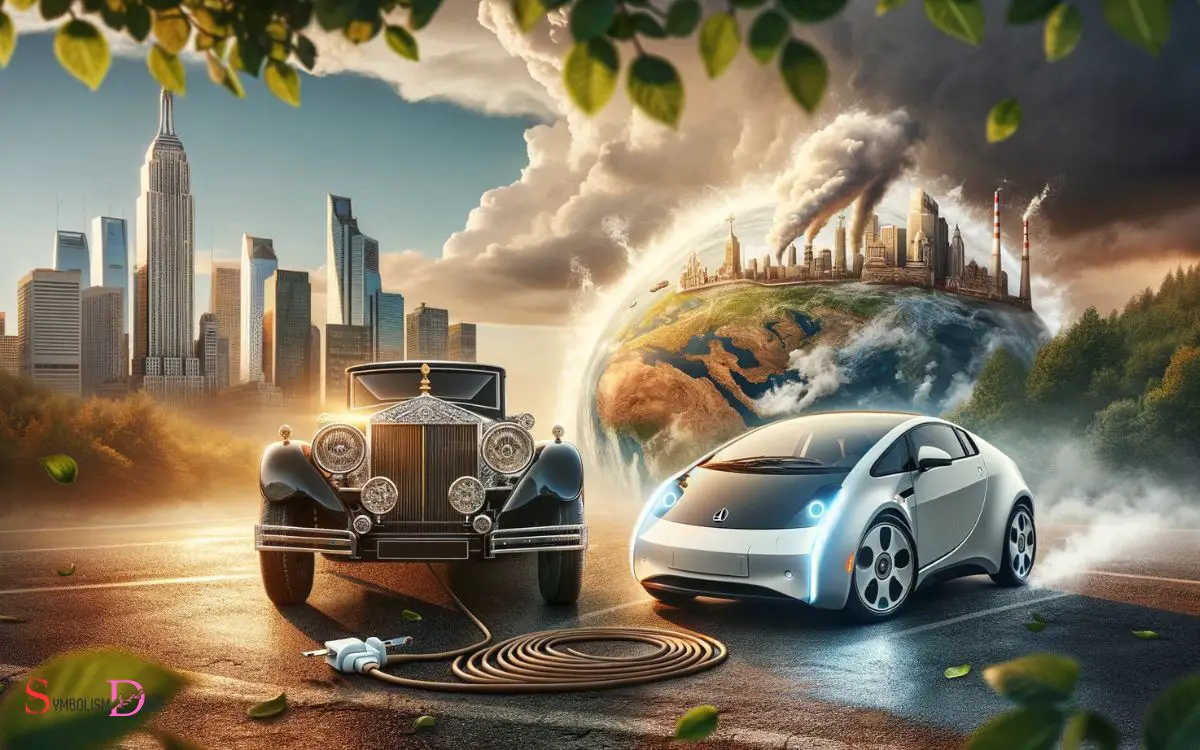Car as a Status Symbol: Transportation!
Owning a car has traditionally been seen as a status symbol, reflecting a person’s wealth, tastes, and social standing.
Luxury brands like Mercedes-Benz, BMW, and Audi, in particular, are often associated with success and prestige.
However, this concept is evolving with the advent of eco-friendly vehicles, where models such as Tesla are redefining what it means to own a status symbol car, balancing luxury with environmental consciousness.
A car as a status symbol is not a new concept. For decades, the make, model, and condition of one’s car have been used as a social signaling tool.
Here’s why cars are seen as status symbols:
For example, driving a Tesla Model S not only showcases financial success but also a commitment to innovation and sustainability.
The changing tides of what defines a car as a status symbol are influenced by technological advancements and a growing cultural emphasis on sustainability.

Key Takeaway
Historical Evolution of Car Symbolism

Throughout the 20th and 21st centuries, the status of cars has evolved from being merely functional to also representing social and economic status. In the early 20th century, cars were a luxury accessible only to the wealthy, symbolizing prestige and exclusivity.
As technology advanced and production methods became more efficient, cars became more affordable, leading to a shift in their symbolism.
They transformed into symbols of freedom, independence, and mobility, accessible to a broader segment of the population.
In recent decades, certain car brands and models have become synonymous with wealth and success, further solidifying the connection between cars and social status.
Today, the type of car one drives can often convey information about one’s economic standing and personal preferences, reflecting the evolution of car symbolism over time.
Psychological Associations With Car Ownership
Owning a car can often be seen as a symbol of personal identity, reflecting an individual’s taste, values, and lifestyle.
The type of car one owns can also have an influence on their self-esteem, as it may be perceived as a reflection of their success and status.
These psychological associations with car ownership play a significant role in how individuals perceive themselves and are perceived by others.

Symbol of Personal Identity
While many people may not consciously realize it, the car they drive often serves as a powerful symbol of their personal identity. The type, make, and condition of a car can reflect a person’s personality, values, and lifestyle.
For instance, a person driving a practical and fuel-efficient hybrid car may be seen as environmentally conscious and practical, while someone driving a luxury sports car may be perceived as successful and adventurous.
Below is a table that illustrates some common psychological associations with car ownership:
| Psychological Association | Example |
|---|---|
| Status and Success | Luxury car brands such as Mercedes or BMW |
| Practicality and Efficiency | Hybrid or electric cars |
| Adventure and Risk-taking | Sports cars or off-road vehicles |
Understanding these associations allows for insight into how cars symbolize personal identity.
The psychological associations with car ownership reveal the deep connection between individuals and their vehicles, highlighting how cars are used to project personal identity and values.
This link will be further explored in the subsequent section about ‘influence on self-esteem’.
Influence on Self-Esteem
The psychological associations with car ownership’s influence on self-esteem are significant in understanding how individuals perceive and value themselves through their vehicles. For many, the type and condition of their car can affect their self-esteem.
Owning a car that is well-maintained and aesthetically pleasing may boost one’s confidence and self-worth, as it can be seen as a reflection of their success and personal image.
On the other hand, individuals with a less desirable car may experience lower self-esteem, especially in social or professional settings where their vehicle is on display.
This association can impact how individuals view themselves and how they believe others perceive them.
Understanding these psychological dynamics is crucial in comprehending the broader significance of cars as status symbols.
Impact of Luxury Car Brands on Status
Luxury car brands have a significant impact on an individual’s status, influencing how they are perceived in society.
The association between luxury car ownership and social status is a well-established phenomenon, with certain brands carrying more prestige than others.
The ownership of a luxury car can elevate one’s social standing and contribute to a perception of wealth, success, and sophistication.

Brand Perception and Status
A significant number of consumers perceive luxury car brands as a symbol of status and prestige.
This perception is largely influenced by the brand’s reputation for superior craftsmanship, cutting-edge technology, and exceptional performance.
The impact of luxury car brands on status is evident in the emotional responses they evoke in consumers:
Sense of Exclusivity
Owning a luxury car brand can evoke a sense of exclusivity and belonging to an elite group, fostering feelings of pride and accomplishment.
Personal Identity
Luxury car brands often become intertwined with an individual’s personal identity, reflecting their taste, success, and social standing. This emotional connection can enhance one’s sense of self-worth and confidence.
Social Status Association
Owning a luxury car brand can significantly impact an individual’s social status and perceived prestige.
Luxury car brands are often associated with wealth, success, and exclusivity, and as a result, owning one can elevate one’s social standing in the eyes of others.
The table below provides an overview of the social status association with some popular luxury car brands.
| Luxury Car Brand | Social Status Association |
|---|---|
| Mercedes-Benz | Associated with success and sophistication |
| BMW | Perceived as a symbol of high social status |
| Audi | Often linked with modernity and luxury |
These associations are not only based on the quality and performance of the cars but also on the brand image they have cultivated over time.
As a result, individuals often seek out luxury car brands to enhance their social status and project a certain level of prestige to others.
Luxury Car Ownership
The ownership of a luxury car brand can significantly influence an individual’s social status and perceived prestige. Luxury car brands like Mercedes-Benz and BMW are often associated with wealth, success, and sophistication.
This association can evoke a sense of admiration and envy among peers, elevating the owner’s status in social circles.
The emotional impact of luxury car ownership includes:
- Pride: Owning a luxury car can instill a sense of pride and accomplishment, boosting one’s self-esteem and confidence.
- Exclusivity: The rarity and high cost of luxury cars can create a feeling of exclusivity and belonging to an elite group, fostering a sense of privilege and superiority.
These emotional responses play a pivotal role in the allure of luxury car ownership, shaping perceptions of status and prestige.
Social Perceptions and Stereotyping Based on Car Choice

Why do people often make assumptions about others based on the type of car they drive? People tend to form social perceptions and stereotypes based on the car someone chooses to drive.
This behavior can lead to assumptions about a person’s wealth, social status, and even personality traits.
For instance, driving a luxury car might lead others to assume that the owner is wealthy and successful, while driving a compact car could lead to assumptions about frugality or practicality.
Below is a table exemplifying some common social perceptions and stereotypes associated with specific types of cars.
| Car Type | Perceptions and Stereotypes |
|---|---|
| Luxury Car | Wealth, Success |
| Sports Car | Adventurous, Reckless |
| SUV | Family-oriented, Practical |
| Hybrid/Electric | Environmentally-conscious |
| Compact Car | Economical, Efficient |
Understanding these social perceptions can provide insight into how car choices are often linked to status and identity.
The Role of Technology and Innovation in Car Status
How does technology and innovation influence the status of cars in today’s market? The rapid advancement of technology and innovation has transformed cars into more than just a mode of transportation. It has elevated them to a symbol of status and prestige.

Here’s how it evokes an emotional response in the audience:
- Excitement: Cutting-edge features and futuristic designs evoke a sense of excitement and wonder, making the ownership of such cars an exhilarating experience.
- Example: The thrill of driving a car with autonomous capabilities or state-of-the-art infotainment systems.
- Pride: Owning a technologically advanced car can instill a sense of pride and accomplishment, as it reflects one’s ability to adapt to and embrace the latest advancements.
- Example: The pride of owning an electric vehicle that not only reduces environmental impact but also showcases a commitment to innovation.
Environmental and Ethical Considerations in Car Symbolism

Considering the environmental and ethical impact of car symbolism, one must acknowledge the interconnectedness of personal values and societal responsibility.
As society becomes increasingly aware of the environmental consequences of its actions, the symbolism associated with cars is evolving. People are now considering the ethical implications of flaunting high-status cars that contribute to pollution and resource depletion.
This shift in perspective reflects a growing understanding of the need for sustainability and responsible consumption.
Ethical car symbolism emphasizes the importance of making choices that align with one’s values while considering their impact on the planet and future generations.
It encourages individuals to prioritize environmental consciousness, fostering a society where status symbols are not only indicative of personal success but also of ethical and sustainable choices.
Owning a Car Has Become a Status Symbol
Owning a car has historically been associated with various social and cultural factors that can elevate it to the status of a symbol. However, the extent to which it is considered a status symbol can vary significantly depending on factors like location, culture, and individual perspectives.

Here are some reasons why owning a car can be seen as a status symbol:
Mobility and Independence: In many places, especially in suburban or rural areas, owning a car provides a level of mobility and independence that is highly valued.
It allows individuals to travel freely, access job opportunities, and explore their surroundings. This sense of freedom and self-reliance can contribute to the perception of a car as a status symbol.
Luxury and Prestige: High-end luxury cars from brands like Mercedes-Benz, BMW, and Rolls-Royce are often associated with wealth and prestige. Owning such a vehicle can signal a certain level of affluence and success, making it a status symbol for some.
Convenience: Cars offer convenience, especially in regions with limited public transportation options. The ability to drive to work, run errands, and transport oneself and one’s family comfortably can be seen as a sign of a certain lifestyle and financial stability.
Social and Professional Image: In some cases, owning a car can enhance one’s social and professional image. It can convey professionalism, reliability, and a certain level of accomplishment.
For example, a person driving a well-maintained, upscale car may be perceived differently than someone without a car or driving an older, less prestigious vehicle.
Symbol of Achievement: For many, owning a car represents an achievement, particularly for those who have worked hard to save up and purchase their first vehicle. It can be a tangible symbol of personal success and financial responsibility.
Cultural and Regional Factors: Cultural norms and regional differences can greatly influence the perception of car ownership as a status symbol. In some societies, having a car may be more important than in others, and the type of car may hold varying degrees of significance.
However, it’s essential to recognize that the significance of car ownership as a status symbol is evolving.
In recent years, there has been a shift toward valuing sustainability and eco-friendliness, leading to a growing interest in alternative transportation modes like public transit, cycling, and electric scooters.
Additionally, car-sharing services and advancements in autonomous vehicles may impact the traditional notions of car ownership and what it symbolizes.
Ultimately, whether owning a car is considered a status symbol or not depends on individual perspectives and societal factors, and this perception can vary widely across different cultures and communities.
Conclusion
The status symbol of a car has evolved over time, reflecting both individual and societal values. From the psychological associations to the impact of luxury brands, car ownership can greatly influence social perceptions and stereotyping.
As technology and innovation continue to shape the automotive industry, the symbolism of a car will only become more complex. In today’s society, the status of one’s car can be as important as the clothes they wear, or even as essential as oxygen.







